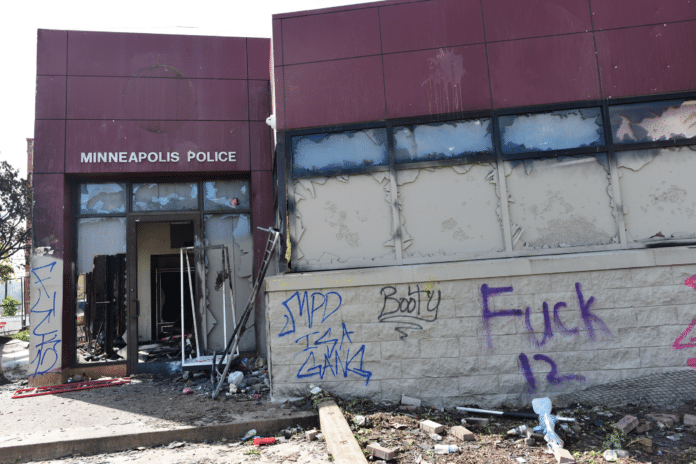
An independent review of how departments and agencies in Minneapolis handled the George Floyd riots revealed that Minneapolis Police Department (MPD) leadership reprimanded officers for using a particular de-escalation tactic.
The review, conducted at the city’s request, led to an 86-page “after-action report” that was delivered to the Minneapolis City Council last Tuesday. The reviewer was Hillard Heintze, a safety and security consulting firm.
Under a subsection titled “De-Escalation,” the firm said the MPD’s de-escalation policy — which exists to “stabilize a situation” and “avoid or minimize use of physical force” — mentions the tactic of “placing barriers between an uncooperative subject and an officer,” an action taken by MPD field commanders during the unrest of May and June 2020.
But the report accuses MPD leadership of wrongfully rebuking the commanders over their use of this tactic.
“In many cases, MPD leadership chastised the commanders for their efforts and in some cases ordered them to remove the barricades,” the report says. “Placing the barricades aligned with de-escalation concepts, protected the precincts and potentially decreased the need for deploying less-lethal munitions. It provided an opportunity to reduce the number of officers standing perimeter security to allow them to respond to calls for service and perform proactive police duties throughout the city.”
Alpha News has covered many of the other findings in the report this past week. They paint a grim picture of departmental miscommunication, overwhelmed personnel, understaffed units, and a general lack of coordination among city agencies.
One section of the report focuses on the “significant toll” that the events of 2020 had on rank-and-file officers.
“Our interviews revealed several factors that officers say contributed to their feelings,” the report says, listing factors such as “physical and mental abuse from people protesting against the police” and “extreme frustration during the riots from not knowing what they were supposed to be doing and who was in charge.”
The report also lists the following: “Perceived abandonment by command and leadership, save the few field commanders who stepped up and took control. Disappointment in MPD leadership, especially after the MPD gave up the 3rd Precinct, to which some officers were emotionally attached. The perception that the incident command did not seem to think about ensuring the officers had eaten and received time to rest and debrief.”
In a press release, Minneapolis Mayor Jacob Frey vowed to implement the report’s recommendations on improving the city’s emergency response coordination.
“Rebuilding trust between community and local government relies on us taking concrete actions informed by this review,” Frey said. “The recommendations highlighted in today’s presentation will be put to use, and I’ve already directed staff to implement a plan for improving our emergency response processes across the enterprise.”
















